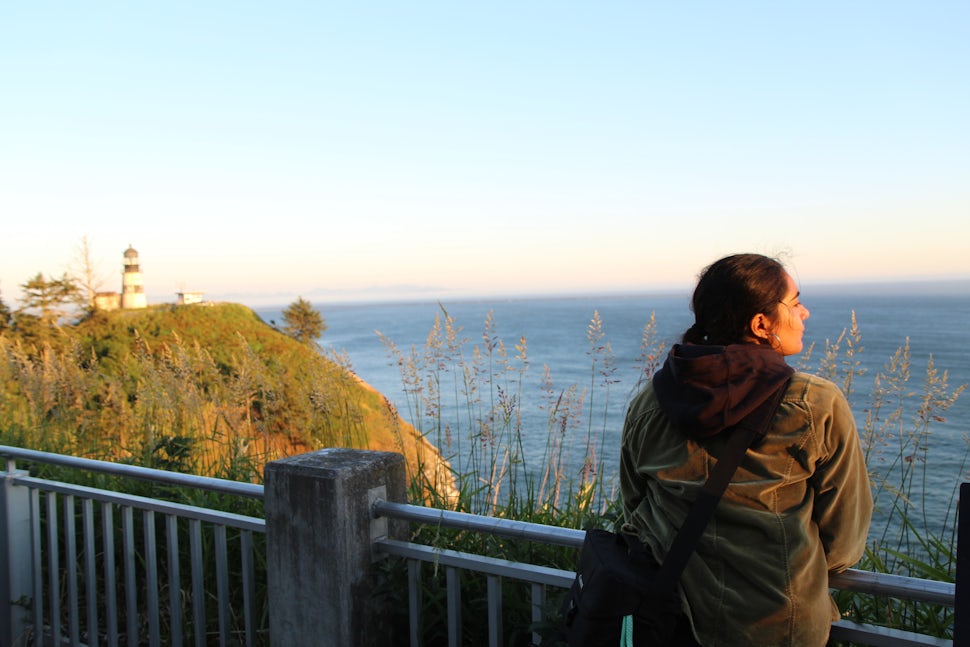The Worst Name for a State Park: Cape Disappointment
Why the Washington State Peninsula should be re-indigenized, starting with Cape Disappointment State Park.

As someone who did not grow up camping in the Pacific Northwest, I felt very intimated approaching the camp-site reservation system for the first time in 2020. Fortunately, I managed to bring together various family members to spend a night in the North Cascades, and even wrote a little blog post about it for Platform Magazine.
This summer however, I wanted to take a bigger risk and explore a state or national park with my partner that we both had never been to. To be honest with you, if it had not been for the Cape Disappointment State Park geo-tag on Instagram, I would have not been all that thrilled to visit a place with the word “disappointment” in it. I also have to admit that when it comes to researching a place I want to recreate in, I don’t overwhelm myself with historical information about the site. I simply focus on the necessary information about our lodging, sites we don’t want to miss, and making sure we have enough food for the trip. Which is why as we explored Cape Disappointment, I was taken back by the historical significance of the state park.

The Disappointing History of National and State Parks
Thanks to all the brilliant Black and Indigenous environmental educators and community organizers, I became aware of the violent history of all national and state parks in the United States. Indigenous people across the country had to be dispossessed of their land and culture in order to preserve these parks for non-natives and settlers to recreate and build wealth in this country. Out of all the state and national parks I have visited, I don’t think that was more obvious than at Cape Disappointment. Starting with the “Lewis and Clark Trail” we walked on, the path led us through a maze of old military bunkers and coast defense batteries. Don’t even get me started on the historical displacement of Black, Indigenous, people of color, due to Westernized militarization. I could write a whole book about how the military complex connects to our current climate crisis. So back to Cape Disappointment, as we wandered around the trailers, although the majority of abandoned steel and cement structures were covered in moss at this point, I couldn’t help feeling uneasy by the spiritual energy from that time period that still vibrates across the land.
It was hard to explain at the moment my feeling of discomfort because we were surrounded by so much natural beauty, but a couple of weeks later I listened to Geraldine King, a member of Kiashke Zaaging Anishinaabek, speak on All My Relations Podcast and it all came together for me. In the latest episode called “All My Loving Relations” she says:
“In thinking about [our Indigenous] connection to the land, how we lost that loving connection being displaced from the land, but also being cut off from our languages that described the land in relational and loving ways. We don’t just name our land Duke of Edenberg, or I don’t know what White men name the lands they take, it’s always after someone. But for us, as I understand in Anishinaabe language and place-naming, it’s always named after the characteristics of the land... So it’s the land telling you how to refer to them”
Cape Disappointment State Park is the settler-colonial name of the land, it’s Indigenous Chinook name is Kah’eese. Nowhere in the Cape Disappointment state park website does it mention the land’s Indigenous name, and at the park there is only one interpretative sign that mentions the name, but nothing else about it’s meaning or the current relationship of the Chinook people to this land. Can you imagine losing such a foundational part of your identity? The land never forgets, and we must work to ensure that the people around us never forget either.

Decolonization Requires Action
There is no justification for the dispossession of Indigenous people from their land to provide recreational areas for others to enjoy. For the Chinook people, the justification for re-naming their Indigenous land is based on yet another White man’s incompetence. According to the state park’s website, it’s name “...is credited to English Captain John Meares, who approached the cape in 1788, but could not locate the river's entrance. Meares, therefore, named the headland Cape Disappointment.” The river was there all along! And the Chinook people have known this, but of course if a White man didn’t discover it then it doesn’t exist. This is not a “quirky, fun” story that should dictate the name of such sacred lands. This should be a reminder to all that through settler-colonial practices we will never have a reciprocal relationship with the land. Decolonizing our relationship with the outdoors requires reparations to Indigenous people. Re-indigenize Cape Disappointment State Park, bringing forth the original stories of the land and it’s Indigenous people to steward that land.

Cover photo: Jameson Jones
We want to acknowledge and thank the past, present, and future generations of all Native Nations and Indigenous Peoples whose ancestral lands we travel, explore, and play on. Always practice Leave No Trace ethics on your adventures and follow local regulations. Please explore responsibly!
Do you love the outdoors?
Yep, us too. That's why we send you the best local adventures, stories, and expert advice, right to your inbox.








